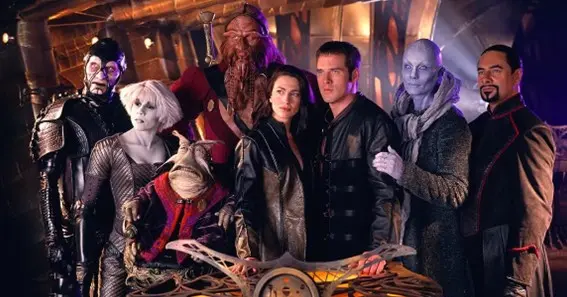The 1990s were a golden era for science fiction television, introducing audiences to imaginative worlds, complex characters, and thought-provoking narratives. These shows not only entertained but also explored themes that resonated with viewers, leaving a lasting impact on the genre.
The Rise of 90s Sci-Fi Television
The 1990s witnessed a surge in science fiction television series, each contributing uniquely to the genre’s evolution. This period saw a blend of groundbreaking storytelling and innovative special effects, captivating audiences worldwide.
Star Trek: Deep Space Nine (1993–1999)
A standout in the Star Trek franchise, “Deep Space Nine” deviated from the traditional exploratory narrative by setting the story on a space station. This stationary setting allowed for intricate political and social storylines, delving into themes of war, religion, and morality. Its serialized storytelling was ahead of its time, influencing future television narratives.
The X-Files (1993–2002)
“The X-Files” became a cultural phenomenon, following FBI agents Mulder and Scully as they investigated unexplained cases. The show’s blend of conspiracy theories, paranormal activities, and character-driven plots captivated audiences, making it one of the most influential sci-fi series of the decade.
Babylon 5 (1994–1998)
“Babylon 5” was lauded for its ambitious storytelling, featuring a pre-planned five-year story arc—a rarity at the time. Set on a space station, the series explored political, social, and philosophical themes, earning a dedicated fan base and critical acclaim for its narrative complexity.
Stargate SG-1 (1997–2007)
Expanding upon the 1994 film “Stargate,” this series followed a military team exploring other planets via an ancient transportation device. Combining adventure, mythology, and science fiction, “Stargate SG-1” developed a rich universe that spawned multiple spin-offs.
Farscape (1999–2003)
“Farscape” offered a unique blend of live-action and puppetry, following an astronaut who finds himself in a distant part of the universe. Known for its imaginative storytelling and complex characters, the series pushed the boundaries of practical effects and narrative depth in science fiction television.
The Legacy of 90s Sci-Fi Shows
The impact of these 90s sci-fi shows extends beyond their original airings. They paved the way for modern serialized storytelling, demonstrated the viability of complex character development in genre television, and showcased the potential of science fiction to explore profound societal and philosophical issues.
FAQ
1. What made 90s sci-fi shows distinct from other eras?
The 1990s introduced serialized storytelling and complex character arcs in sci-fi television, moving beyond episodic formats to explore deeper narratives.
2. Are these 90s sci-fi shows available for streaming today?
Yes, many of these series are available on various streaming platforms, allowing new audiences to experience these classic shows.
3. How did “The X-Files” influence future television series?
“The X-Files” popularized the blend of procedural drama with overarching mythologies, influencing numerous shows that followed.
4. What is the significance of “Babylon 5” in television history?
“Babylon 5” was one of the first series to implement a pre-planned, multi-season story arc, influencing the structure of future television narratives.
5. Did “Stargate SG-1” lead to other series or media?
Yes, “Stargate SG-1” spawned several spin-offs, movies, and a robust expanded universe, solidifying its place in sci-fi history.
The 1990s were a transformative period for science fiction television, with shows that continue to influence the genre today. Their legacy is evident in modern storytelling techniques and the enduring popularity of science fiction narratives.










